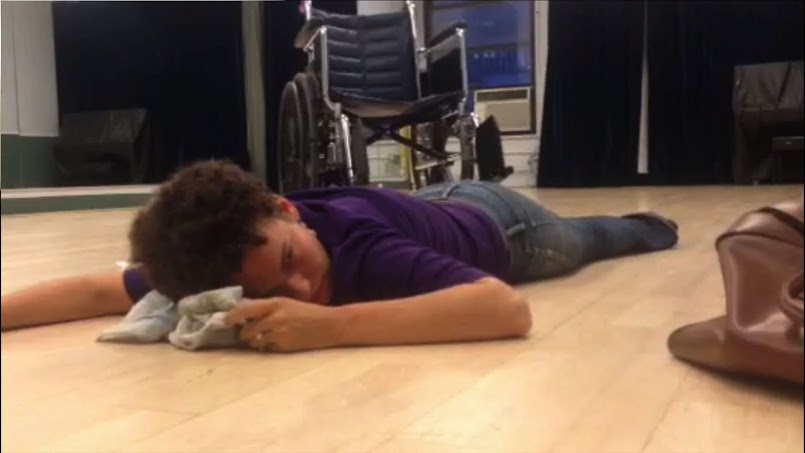



(Thanks to Julie for allowing Health Rising to reprint her original blog posted on The Last Word on Nothing)
Eight years ago, collapsed on a neurologist’s examining table, I asked a naive question that turned out to be at the center of a controversy continuing to this day. I had just received a diagnosis for the illness that had been gradually overtaking me for the previous six years, and I asked, “So what is chronic fatigue syndrome?”
A week earlier, I’d woken up suddenly barely able to walk. “Fatigue” hardly described what I felt: “Paralysis” was more like it. My legs seemed to have been amputated and replaced with tubes of liquid concrete, and just shifting them on the table made me grunt like an Olympic weightlifter. Not only that, my very bones hurt. Most disturbingly, my brain felt like a swollen mass. Speaking required tracking down and spearing each word individually as it scampered away from me. I felt as capable of writing an article about science – my job – as of slaughtering a rhino with my teeth.
My neurologist’s face was blank as he pronounced, “We don’t understand it very well.” He could recommend no tests, no treatments, no other doctors. I came to understand that for him, “chronic fatigue syndrome” meant “I can’t help you.”
My neurologist’s understanding of the illness closely reflected that of most doctors, who typically believe two things about CFS: that it’s probably psychosomatic, and that there’s nothing doctors can do for these patients. Experts have known otherwise for decades. The result is that while patients don’t get the help they need, they often do get a helping of scorn.
The Department of Health and Human Services (HHS) has launched an effort to change these misperceptions, it says, arguing that the problem goes back to that very first question I asked: What is chronic fatigue syndrome? There are currently many competing definitions, and none of them has trickled down to doctors. So HHS has hired the Institute of Medicine, an affiliate of the National Academies, to develop yet another definition of the illness. The stated hope is that doctors will embrace a definition developed by such a prestigious institution and then learn about treatments.
But the CFS community of experts, advocates and patients has responded to this plan with a revolt. Fifty specialists in the illness (nearly all of them) wrote to HHS requesting cancellation of the contract, and hundreds of patient advocates and thousands of patients wrote in support of the experts. And unfortunately, this is just the latest in a long string of disputes between the federal agencies and the CFS community, disputes that have nearly derailed the central work of understanding a disease acknowledged by all to sometimes be as disabling as late-stage AIDS or heart failure.
At the time of my diagnosis, though, I was far too consumed with learning to cope to worry about the politics of CFS. A couple of weeks after my trip to the neurologist, I woke up feeling better enough to venture to the grocery store. By the time I put the bags in the car, though, I was quivering with exhaustion. That night I was too weak to turn over in bed. Overexertion, I realized, was my enemy, so I began a program of aggressive rest. Gradually, I got stronger and the limits lifted.
But over the next five years, I got worse again, then better, then worse. I consulted doctors, but when they couldn’t help much, I stopped. Each time I was stuck in bed, I scoured my activities, my diet, my environment, seeking a reason. Ultimately I concluded my illness might have been controlled by the Greek gods, creatures more irrational and capricious than the human mind can comprehend.
Then in 2011, I disintegrated. Day after day, I couldn’t get out of bed, couldn’t work, couldn’t even focus my eyes to read a novel. I flew across the country and staggered into the office of Dr. Nancy Klimas, an immunologist and CFS expert at the University of Miami. She smiled and said wryly, “Your legs aren’t working too well for you there! We should be able to get you feeling better.” I nearly cried.
She told me that although CFS didn’t yet have a cure, she and other researchers had discovered a lot about it. At that moment, many thought the retrovirus XMRV might be the cause, though she was growing skeptical and soon thereafter the theory was disproven. Regardless, she told me, she and her fellow researchers were certain the illness wasn’t psychosomatic. The physiological abnormalities in CFS patients were too consistent for that.
She soon confirmed those patterns in me: Some parts of my immune system barely functioned, while others were in overdrive. Several viruses had become reactivated in my body, causing mischief long after the initial infection was past. My heart couldn’t manage to pump enough blood to my brain when I stood up: After six minutes of standing still, my blood pressure fell to 80/52, my heart raced, and I begged to lie down lest I vomit or pass out.
One test I declined, the two-day exercise test. When CFS patients exercise to exhaustion two days in a row,their output plummets the second day though they work just as hard. In addition, their bodies flag at using oxygen, inflammation goes wild, and their very cells change, reading their genes differently. That pattern, called exercise intolerance, seems unique to CFS. The test can help prove disability and provide objective guidelines patients can use to regulate their activities, but it can also leave them even sicker for months.
Though Klimas couldn’t cure me, she helped. She gave me immune modulators so my immune system wouldn’t overrev as though I were fighting an eternal flu. She worked to improve my sleep. She prescribed beta blockers to steady my heart rate when I stood. The most effective treatment was astonishingly simple: Gatorade. Electrolytes increased my blood volume – typically a liter low in CFS patients – thereby stopping my blood pressure from dropping so dramatically. She also monitored me for cancers common in CFS patients, since our natural killer cells, the immune system’s designated cancer assassins, barely function.
I improved enough to work a little bit, and it was a tremendous relief to have a knowledgeable and compassionate doctor behind me. Still, Klimas (who also treats HIV/AIDS) says if she had to choose between having HIV and CFS, she’d unquestionably choose HIV. Two decades of well-funded research have made HIV a manageable chronic illness, while her CFS patients often remain disabled.
I was extremely fortunate to get such competent care. There are a dozen or two US specialists to treat the one million Americans with CFS, and most non-specialists are as hamstrung by lack of knowledge about the illness as the neurologist who diagnosed me. Somehow, doctors haven’t gotten the word that CFS is a physiological illness with physiological treatments that help. Once I grew so sick that the illness dominated my life, I couldn’t get the question out of my mind: Why?
____
Julie Rehmeyer is a math and science writer in Santa Fe, NM. She is a contributing editor for Discover Magazine and has written for Science News, Wired, Slate, Science, and other publications. She is working on a book about her experience with ME/CFS and the science and politics of confusing illnesses. She recently wrote about her father for Aeon.
The photos are stills from a movie about ME/CFS, called Canary in a Coal Mine, by Jennifer Brea, Deborah Hoffmann, Blake Ashman, and Kiran Chitanvis. The stills are captioned, in order, Jen After a Full Day of Shooting, and Jen’s Wall of Mysteries.









Immune modulators and beta blockers, could you be more specific? Thanks, RP
The immune modulator was Imunovir. I don’t remember the exact beta blocker she prescribed, but I’m not sure how much that matters. It may also be determined more by your other health needs.
Hi Julie,
I grew up near Santa Fe (I left there in the late 80’s) but have wondered SO MANY times if something there indeed contributed to my CFS.
May I ask, did your symptoms start when you were in Santa Fe???
If you would like to contact me to discuss it further, I would welcome the opportunity!
Thank you
Hi, I have had M.E. over 21 years…Sorry head bit fuzzy at moment, but please check out …
BBC Democracy Live Debate Feb 2012 on Myalgic Encephalomyelitis,,,YouTube .com/watch. Nothing has changed …Thanks for your article 🙂
Julie,
You have explained this so well!
Keep up your efforts to get the word out.
I’ve had this illness for almost 22 yrs and am 61 yrs now,
but still have some hope for recognition in the Medical world
and for effective treatments.
I too have an awesome Dr–Lucinda Bateman–and feel so lucky!
There are still many things to be grateful for!
Did anyone ever come up with a idea why all of a sudden you had such trouble walking? It reminds me of Lauren Tiles story; she suddenly (it was after a concussion actually) couldn’t walk. It turned out the peripheral nerves in her body had attacked overnight probably by an autoimmune process.
Has anyone checked out small fiber neuropathy?
No, I haven’t heard any especially compelling explanations of why I had trouble walking. And I don’t know anything about small fiber neuropathy.
In the past six months I’ve heard of two women who woke up and couldn’t walk or could hardly walk. You must read Lauren Stiles story if you haven’t yet.
http://www.cortjohnson.org/blog/2013/08/20/from-chronic-fatigue-syndrome-to-fibromyalgia-to-pots-to-success-one-womans-journey-through-the-medical-profession/
I also came across a woman who woke up barely able to walk who was found to have Guillain Barre disease.
Small fiber neuropathy occurs when the something attacks the small nerves in our body. The research is pretty new but it appears to be pretty common in FM.
http://www.cortjohnson.org/blog/2013/08/06/small-fibe-nerve-study-suggests-new-era-in-fibromyalgia-and-perhaps-chronic-fatigue-syndrome-may-be-at-hand/
Hello, Julie. Thanks for this post. A friend gave me the heads up about it. What are the cancers CFS patients are prone for? I need to pass that on to my doctor. I’ll have to do a self test about the blood pressure thing. It would explain why I can’t stand for very long. My doctor isn’t one of those well versed in CFS. How is your book doing? I have turned to writing as an outlet for my creativity.
So grateful for those things Carol referred to. Yes! There are things to be grateful for! Hang in there. I’m glad you’ve learned to deal with your CFS. One of these days there will be some successful treatments for us.
Tim
We’re more prone to pretty much all cancers, because our natural killer cells function so poorly. But we’re especially prone to lymphomas, I believe.
Nearly everyone with ME/CFS has orthostatic intolerance (i.e., POTS and/or NMH). And yes, you can easily test for it yourself using the “poor man’s tilt table test.” It’s the first thing that anyone with ME/CFS should be tested for.
Thanks for the response. I found some great information about the poor man’s tilt table test on the internet and I’ll soon have my wife help me take it. Thanks again. On the cancer problem, do you have information a doctor might consider valid in order to convince my regular doctor to help keep an eye out for cancer. Also, I’m going to use your information to make a thread on the CFS support forum I go to. This is great info. Thank you very much. It is great to find out why I feel tired/faint so soon when I’m standing still.
Tim
Check out P. 6 of http://www.paradigmchange.me/cfs-info/me-and-cfs-medical-abnormal/me-cfs-and-medical-abnormal.pdf.
Personally, I think some doctors are just unwilling to admit they don’t know everything. More than once I’ve diagnosed my own health problem and upon presenting my theory to my GP, he’s tested or Xray/ultrasound/MRI and discovered I’m correct. Now, he will refer me for any blood test or scan I ask of him, knowing that I’m in tune with my bodily functions and can sometimes put the jigsaw puzzle together better than he.
My theory is that there is a big difference between a Western trained Medical Doctor and a Healer. There are many great Healers in this world today and they don’t necessarily have years of education, training and/or experience. They are highly intuitive and have the inquiring mind that is willing to listen and suss out a long range of symptoms and chronic illness history.
I asked my niece about her own knowledge when I was diagnosed with FM, (and my GP concedes, probably CFS), in 2006 after chronic pain since 1981. She is a Doctor…..and now an Oncologist. She said ME/CFS is just so hard to diagnose. She had almost no knowledge of it herself and said that the symptoms are so common to many other ‘difficult to diagnose’ health conditions. To the average doctor, its basically a case of ruling out diseases with similar symptoms first. (e.g. MS).
The issues with standing and bp drops sounds like OI. My sis has this along with CFS too. When she did her TTT (tilt table test) her heart actually stopped. Dysautonomia seems to go along with this. Many are associating immune issues and/or virus.
Cort, one of the main test with POTS is a Qsart test. So many of us have SFN. If this shows something then we have biopsies to further check.
http://www.neurology.upmc.edu/neuromuscular/patient_info/testing.html
Issie
Yes, Julie you should know that SFN is really quite new in Fibromyalgia (just in the past year) and I imagine that most ME/CFS docs have hardly heard about it. In the most recent blog on it an FM doctor says FM and ME/CFS are so much alike that he really doesn’t differentiate between the two much.
Here’s the latest blog: http://www.cortjohnson.org/blog/2014/04/29/body-back-fibromyalgia-small-nerve-fiber-damage-suggests-pain-begins/
All very interesting. Thanks.
Julie is in such a perfect position to write about these dismal efforts to help sufferers of CFS/ME. She’s been able to publish in some widely read publications and that would be a wonderful platform for getting out the truth of this disease. This article is a very good start, hopefully she’ll be able to re-publish in other venues. Glad she found Dr. Klimas. I did too when I’d gotten to rock bottom and finally found her in the never ceasing search for help with this condition. I hate to have to welcome anyone to our world of pain, but at least the new folks with it will find out more than many of us knew 20 or 30 years ago when we got it. Personally, I am going to take it as a positive for the IOM to give it some new legitimacy. Baby steps : (
The IOM is going to help out (although check out Julie’s next blog – it may have been a year too early (lol) – but it will still bring recognition to this disorder. I asked Ron Davis who’s on the panel what he thought about it and he was very excited about it. He feels this kind of thing is just what ME/CFS needs to gain legitimacy.
The Gulf War definition effort (with no GWS experts on it) – did fine and we have some strong advocates on the panel. I’m not worried.
The good news is that Nancy Klimas thinks this year and next are going to bring alot of good data on ME/CFS (which probably won’t get into the IOM def). We should keep in mind that it’s a clinical definition, as well – it’s not the research definition – the really touchy one.
Hello Julie,
I came down with CFS/ME in 1986/7 whilst in college. Extreme, unrelenting stress or having fillings replaced by a dentist could have caused it. I DO believe they will find it is a RETROVIRUS and a virus that cause it. I am in my late 40’s and now that my stress is low, my symptoms are managable but I still have symptoms , the worst are: unrefreshed sleep. Feel zombie-like for 2 hours after I get up 2) When I over-exert, I see things moving away from me ( optic neuropathy?) and thermo-regulatory issues (always hot and can’t wear sweaters unless outside and cold).
I got quite a bit from reading your blog and admire YOU as a person. How are you doing now?
Peace!
Q: Why Are Doctors Skeptical & Unhelpful about Chronic Fatigue Syndrome?
A: Because the science of medicine is less like a science and more like a faith based religion.